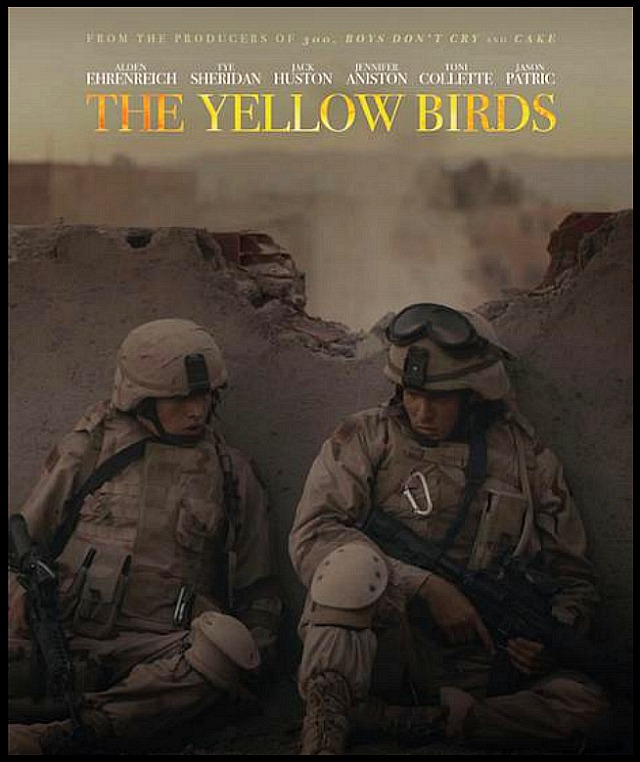I’m filling out my Sundance press accreditation form this weekend. This led to memories of last January’s festival, and a particularly awful time I had watching Alexander Moors‘ The Yellow Birds, an Iraq War PTSD drama. Jason Hall‘s Thank You For Your Service deals with nearly the exact same subject, but in a way that I found ten times more affecting and effective. Maybe because I didn’t have to deal with Alden Ehrenreich, whose gloomy-Rabbinical-student performance all but sank Yellow Birds.
As far as I can tell Yellow Birds never found a North American distributor. Which, if true, suggests that buyers felt the same way I did. Like me they probably sat in their Eccles seats in a state of numb submission, toughing it out and waiting for something (anything!) interesting to happen.

How can the Sundance guys approve films like The Yellow Birds and yet turn down well-made genre flicks, which they’ve been known to do from time to time? It just reenforces the idea that the term “Sundance film” is not a myth. John Cooper and Trevor Groth are known for preferring a certain kind of solemn, squishy, angsty, social-issue, ahead-of-the-curve, relationshippy black-gay-transgender politically correct film.
If Sundance had been going in ’73 and Lamont Johnson‘s The Last American Hero had been submitted, they would’ve turned it down because it’s got too many car chases and is about rednecks smuggling moonshine.
The Yellow Birds is about the investigation of the death of an Iraq War combatant named “Murph” (i.e., Daniel Murphy, played by Tye Sheridan), but more precisely about evasions and suppressions on the part of Murph’s PTSD-aflicted comrade, John Bartie (Ehrenreich), when he returns home.
Murph’s mom Maureen (Jennifer Aniston) naturally wants to know what happened, and Bartie’s mom Amy (Toni Collette) is seriously concerned about her son’s totally withdrawn, zombie-like manner. There’s also a Sergeant Sterling (Jack Huston) with his own buried trauma issues, and a CID investigator (Jason Patric) with a persistent interest in what happened between Murph and John.
The Yellow Birds has moments of visual beauty but is otherwise disappointing — it doesn’t connect or sink in. And the ending is seriously weak tea.
After it ended I ran into a Los Angeles guy who runs a film series, and so I briefly shared my reservations about the film and Ehrenreich in particular. He said he “liked” The Yellow Birds and so did the people he was sitting with, and that Ehrenreich’s ability to reanimate Han Solo wasn’t an issue as far as Yellow Birds is concerned.
I thought this film-series guy was someone I could talk to, and yet suddenly he was behaving like a typical Sundance goodviber, reluctant to be truly honest, searching for whatever upbeat impressions he could pass along. The pop-out quote from our discussion was when he said to me that “if you’re only looking to hate, that’s all that’s going to happen whenever you see a new film.” In other words, my attitude is that of a glass-half-empty type of guy while he’s a committed believer in glasses half full. That remark told me everything.
Later I wrote this guy a note: ”Sorry if I seemed overly negative about Yellow Birds when we spoke earlier. I guess I was thrown by the fact that you were positive about a film that is so flat-out mediocre, so uninvolving, so mystifying, so boring in the final analysis. I didn’t realize that you’re basically committed to loving films as much as your heart allows. You’re very sharp and knowledgeable, but business-wise you’re one of those ‘wow, I love movies!’ guys. Mr. Alpha, Mr. Easy. This is your approach — I get it.”












